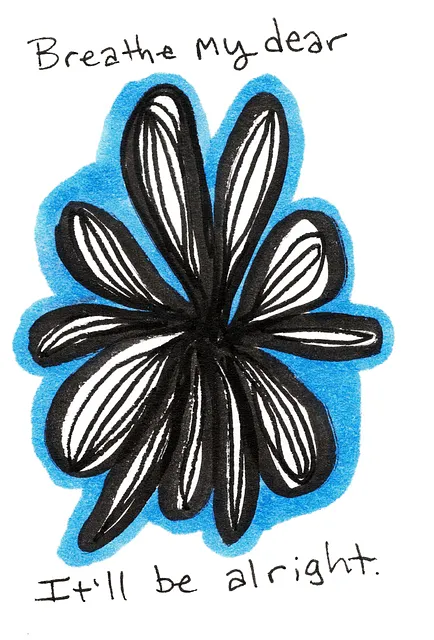Mindfulness meditation, as promoted by Boulder Kaiser Mental Health, is an ancient practice that enhances self-awareness, emotional regulation, and connection. The Boulder Kaiser Approach integrates mindfulness into holistic mental health programs, focusing on emotional intelligence and providing powerful coping mechanisms for stress, anxiety, and trauma. Beginners can start with simple techniques like breath focus and body scans, while advanced practitioners may engage in extended silent retreats and daily 90-minute sittings. These practices ultimately foster inner strength and a deeper connection to one's true nature, aligning with Boulder Kaiser's mental health advocacy and public awareness campaigns.
“Unwind your mind, embrace peace—discover the transformative power of mindfulness meditation. This comprehensive guide explores the art of calming the mind, with a focus on the Boulder Kaiser Approach, integrating mindfulness into mental health care.
We’ll delve into the benefits for mental well-being, offering practical tips for beginners and advanced practices to enhance your journey. Uncover how this ancient technique can be a modern game-changer in managing stress, anxiety, and more, backed by evidence-based research. Get ready to navigate life’s challenges with newfound clarity.”
- Understanding Mindfulness Meditation: Unlocking the Potential for Mental Well-being
- The Boulder Kaiser Approach: Integrating Mindfulness into Mental Health Programs
- Getting Started with Meditation Practice: Tips and Techniques for Beginners
- Advanced Practices and Benefits: Expanding Your Mindfulness Journey
Understanding Mindfulness Meditation: Unlocking the Potential for Mental Well-being

Mindfulness meditation is a practice that involves focusing one’s awareness on the present moment, while calmly acknowledging and accepting feelings, thoughts, and bodily sensations. It’s about cultivating a non-judgmental awareness, allowing individuals to unlock their potential for mental well-being. This ancient technique has gained significant attention in modern times, particularly through programs like those offered by Boulder Kaiser Mental Health, for its profound effects on stress management and overall mental wellness.
By integrating mindfulness into daily routines, individuals can develop a stronger sense of self-awareness, enhance emotional regulation, and foster healthier relationships. It’s not just about sitting quietly; it’s an active process of observing and accepting the constant stream of thoughts and sensations without getting caught up in them. This simple yet powerful practice has been shown to reduce symptoms associated with anxiety, depression, and even trauma (Trauma Support Services), making it a valuable tool in anyone’s quest for mental wellness, as explored in our Mental Wellness Podcast Series Production.
The Boulder Kaiser Approach: Integrating Mindfulness into Mental Health Programs

The Boulder Kaiser Approach to integrating mindfulness into mental health programs has gained significant traction due to its holistic and evidence-based methodology. This innovative strategy recognizes the profound impact of mindfulness practices on enhancing emotional intelligence, a key aspect often overlooked in traditional therapy approaches. By weaving mindfulness meditation into existing Boulder Kaiser mental health programs, the approach aims to empower individuals with effective coping mechanisms for managing stress, anxiety, and other mental health challenges.
This integration goes beyond mere addition; it involves strategic placement of mindfulness exercises within various program components, from individual therapy sessions to group support meetings. The goal is to cultivate a culture of awareness and self-compassion, complementing the existing Mental Health Policy Analysis and Advocacy efforts by promoting public Awareness Campaigns Development focused on mental wellness. This comprehensive strategy ensures that participants not only receive professional treatment but also develop lifelong skills to navigate life’s challenges with greater resilience and emotional balance.
Getting Started with Meditation Practice: Tips and Techniques for Beginners

Starting a mindfulness meditation practice can seem daunting, but with some simple tips and techniques, beginners can quickly establish a routine that enhances their Boulder Kaiser mental health programs. Begin by finding a quiet space where you won’t be disturbed. Set a timer for 5-10 minutes to start, gradually increasing the duration as comfort allows. Focus on your breath, observing its natural rhythm without trying to control it. When thoughts inevitably wander, gently guide your attention back to your breath.
Consider incorporating Self-Awareness Exercises like body scans or gratitude practices to deepen your practice. Emotional Healing Processes can be facilitated by meditating with an open mind, allowing feelings to come and go without judgment. For added guidance, keep a Mental Wellness Journal to reflect on your experiences. Write down thoughts, emotions, and any challenges that arise during meditation, noting improvements over time.
Advanced Practices and Benefits: Expanding Your Mindfulness Journey

As you progress on your mindfulness journey, exploring advanced practices can deepen your experience and unlock even more benefits. Beyond the foundational techniques, individuals often find that integrating longer meditation sessions, such as extended silent retreats or daily 90-minute sittings, enhances their ability to cultivate present-moment awareness. These practices encourage deeper introspection, fostering a greater understanding of one’s thoughts, emotions, and bodily sensations.
The Boulder Kaiser mental health programs offer a range of advanced mindfulness meditations designed to support emotional healing processes and inner strength development. Through these practices, individuals can learn to navigate challenging feelings with more clarity and equanimity. By embracing the silence and stillness, one cultivates a profound sense of self-awareness, leading to greater resilience and a deeper connection with their true nature.
Mindfulness meditation, as explored through the lens of the Boulder Kaiser approach, offers a transformative path toward enhanced mental well-being. By integrating this practice into mental health programs, individuals can unlock profound benefits that extend far beyond stress reduction. Whether you’re a beginner or an advanced practitioner, adopting mindfulness techniques can significantly improve focus, emotional regulation, and overall resilience. The article has provided a comprehensive guide to help you embark on your mindfulness journey, from understanding its fundamentals to exploring advanced practices. Remember, consistent effort and patience are key; just as the Boulder Kaiser programs prioritize holistic mental health, your meditation practice should be nurtured with dedication and care.






